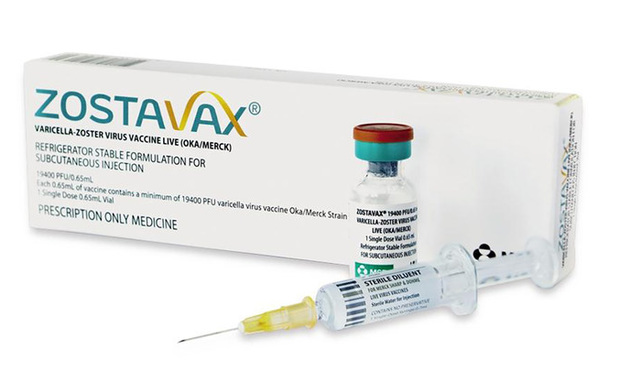McKesson Asks US Judge to Toss Out Shingles Vaccine Cases
McKesson, which is facing claims that it misrepresented the vaccine's safety, filed a motion to dismiss Thursday in the U.S. District Court for the Eastern District of Pennsylvania, contending that 92 cases should be dismissed because the complaints failed to give sufficient details about the allegations.
February 22, 2019 at 03:46 PM
3 minute read
 Zostavax shingles vaccine. Courtesy photo
Zostavax shingles vaccine. Courtesy photo
Pharmaceutical distributor McKesson has asked a federal court in Philadelphia to dismiss more than 90 claims brought against it over the shingles vaccine Zostavax.
San Francisco-based McKesson, which is facing claims that it misrepresented the vaccine's safety, filed a motion to dismiss Thursday in the U.S. District Court for the Eastern District of Pennsylvania, contending that 92 cases should be dismissed because the complaints failed to give sufficient details about the allegations.
“Despite clear guidance from this court and others, plaintiffs and their counsel still fail to specify who made the alleged representations, what was said, when and where the representations were made, why they were untrue, and how plaintiffs were misled,” McKesson said in a 32-page filing. “Instead, the complaints allege that McKesson made unspecified misrepresentations about Zostavax over a 12-year period, in unidentified documents, through unidentified speakers, and under unspecified circumstances.”
Shingles is a rash on the side of the face or body, usually affecting people older than 50. In 2006, the U.S. Food and Drug Administration approved Zostavax as a shingles vaccine.
The litigation hinges on claims that the drug, which was manufactured by Merck—another defendant in the case—caused elevated blood pressure, headaches, eye injury and in some cases, death. Lawsuits were filed in Pennsylvania state court, and federal courts in Pennsylvania, New Jersey, New York, Wisconsin and Massachusetts. However, the litigation was eventually consolidated into a multidistrict litigation before U.S. District Judge Harvey Bartle of the Eastern District of Pennsylvania.
According to the list of pending MDLs, as of Feb. 15, 532 actions are on the In re Zostavax (Zoster Vaccine Live) Product Liability Litigation docket.
In its motion to dismiss, McKesson contended that the court already dismissed four cases for similarly failing to sufficiently allege a claim.
Along with arguing that the plaintiffs failed to point to specific statements or company officials who misled the plaintiffs, McKesson also argued that, at more than 90-pages, the complaints were too long and needlessly complicated. McKesson also contended that the plaintiffs lumped it in with its claims against Merck.
According to McKesson, the cases are “product liability cases with bolted-on fraud claims.” But the company contended that the fraud claims against have so far “not fared well.” According to the motion to dismiss, before the MDL was created, judges in Pennsylvania, New York and Florida dismissed similar fraud claims for being too vague.
“Multiple federal judges have advised plaintiffs and their attorneys deficiencies in their Zostavax form complaints, and plaintiffs have had ample opportunity to correct those deficiencies through pleading amendments,” McKesson said. “Having failed to heed the federal courts' instructions, plaintiffs' complaints should be dismissed, and their fraud claims should be dismissed with prejudice.”
Gordon Kessler of Marc J. Bern & Partners in New York, who is representing plaintiffs, did not return a call for comment. McKesson's attorney, New York-based Thomas Kurland of Patterson Belknap Webb & Tyler, also did not return a call for comment.
This content has been archived. It is available through our partners, LexisNexis® and Bloomberg Law.
To view this content, please continue to their sites.
Not a Lexis Subscriber?
Subscribe Now
Not a Bloomberg Law Subscriber?
Subscribe Now
NOT FOR REPRINT
© 2025 ALM Global, LLC, All Rights Reserved. Request academic re-use from www.copyright.com. All other uses, submit a request to [email protected]. For more information visit Asset & Logo Licensing.
You Might Like
View All
Ozempic Defendants Seek to Shave 'Tacked On' Claims From MDL Complaint
3 minute read
Plaintiff Argues Jury's $22M Punitive Damages Finding Undermines J&J's Talc Trial Win
4 minute read
'Discordant Dots': Why Phila. Zantac Judge Rejected Bid for His Recusal
3 minute read
Pittsburgh Jury Tries to Award $22M Against J&J in Talc Case Despite Handing Up Defense Verdict
4 minute readTrending Stories
- 1Gunderson Dettmer Opens Atlanta Office With 3 Partners From Morris Manning
- 2Decision of the Day: Court Holds Accident with Post Driver Was 'Bizarre Occurrence,' Dismisses Action Brought Under Labor Law §240
- 3Judge Recommends Disbarment for Attorney Who Plotted to Hack Judge's Email, Phone
- 4Two Wilkinson Stekloff Associates Among Victims of DC Plane Crash
- 5Two More Victims Alleged in New Sean Combs Sex Trafficking Indictment
Who Got The Work
J. Brugh Lower of Gibbons has entered an appearance for industrial equipment supplier Devco Corporation in a pending trademark infringement lawsuit. The suit, accusing the defendant of selling knock-off Graco products, was filed Dec. 18 in New Jersey District Court by Rivkin Radler on behalf of Graco Inc. and Graco Minnesota. The case, assigned to U.S. District Judge Zahid N. Quraishi, is 3:24-cv-11294, Graco Inc. et al v. Devco Corporation.
Who Got The Work
Rebecca Maller-Stein and Kent A. Yalowitz of Arnold & Porter Kaye Scholer have entered their appearances for Hanaco Venture Capital and its executives, Lior Prosor and David Frankel, in a pending securities lawsuit. The action, filed on Dec. 24 in New York Southern District Court by Zell, Aron & Co. on behalf of Goldeneye Advisors, accuses the defendants of negligently and fraudulently managing the plaintiff's $1 million investment. The case, assigned to U.S. District Judge Vernon S. Broderick, is 1:24-cv-09918, Goldeneye Advisors, LLC v. Hanaco Venture Capital, Ltd. et al.
Who Got The Work
Attorneys from A&O Shearman has stepped in as defense counsel for Toronto-Dominion Bank and other defendants in a pending securities class action. The suit, filed Dec. 11 in New York Southern District Court by Bleichmar Fonti & Auld, accuses the defendants of concealing the bank's 'pervasive' deficiencies in regards to its compliance with the Bank Secrecy Act and the quality of its anti-money laundering controls. The case, assigned to U.S. District Judge Arun Subramanian, is 1:24-cv-09445, Gonzalez v. The Toronto-Dominion Bank et al.
Who Got The Work
Crown Castle International, a Pennsylvania company providing shared communications infrastructure, has turned to Luke D. Wolf of Gordon Rees Scully Mansukhani to fend off a pending breach-of-contract lawsuit. The court action, filed Nov. 25 in Michigan Eastern District Court by Hooper Hathaway PC on behalf of The Town Residences LLC, accuses Crown Castle of failing to transfer approximately $30,000 in utility payments from T-Mobile in breach of a roof-top lease and assignment agreement. The case, assigned to U.S. District Judge Susan K. Declercq, is 2:24-cv-13131, The Town Residences LLC v. T-Mobile US, Inc. et al.
Who Got The Work
Wilfred P. Coronato and Daniel M. Schwartz of McCarter & English have stepped in as defense counsel to Electrolux Home Products Inc. in a pending product liability lawsuit. The court action, filed Nov. 26 in New York Eastern District Court by Poulos Lopiccolo PC and Nagel Rice LLP on behalf of David Stern, alleges that the defendant's refrigerators’ drawers and shelving repeatedly break and fall apart within months after purchase. The case, assigned to U.S. District Judge Joan M. Azrack, is 2:24-cv-08204, Stern v. Electrolux Home Products, Inc.
Featured Firms
Law Offices of Gary Martin Hays & Associates, P.C.
(470) 294-1674
Law Offices of Mark E. Salomone
(857) 444-6468
Smith & Hassler
(713) 739-1250





